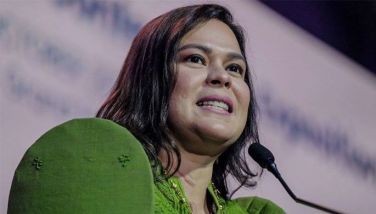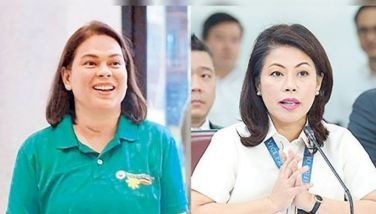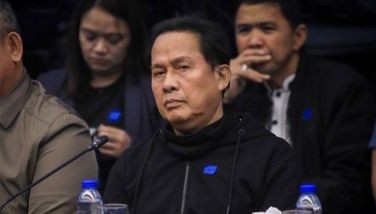Melo commission vows to finish probe on killings by December
September 7, 2006 | 12:00am
The six-member Melo Commission created by President Arroyo to conduct an exhaustive investigation into the killings of militant activists and journalists will try to wrap up its job before year-end.
"We will try to finish (the probe) by December (this year) or January (next year)," retired Supreme Court justice Jose Melo told The STAR in a telephone interview. He also said that his commission was not given a quick timetable to follow.
Melo said they will hear start hearing the presentation of evidence by Task Force Usig headed by PNP Deputy Director Avelino Razon, who was earlier asked by Mrs. Arroyo to conduct an investigation, on Sept. 11.
"We will first hear (Task Force) Usig. We will narrow down the cases after that. We are waiting for people to come forward," Melo said. He also said he is not sure whether daily hearings will be held for the entire duration of the probe.
"We will see (if we can hold daily hearings). It depends on the number of witnesses. Maybe we can start at 9 a.m. onwards, or until the afternoon," he said. The venue will be at the Integrated Bar of the Philippines (IBP) main office along Julia Vargas street in Ortigas Center, Pasig City.
Other members of the Melo commission are Chief State Prosecutor Jovencito Zuño, National Bureau of Investigation (NBI) director Nestor Mantaring, a Catholic bishop, UP Board of Regents member Nelia Gonzalez and lawyer Rogelio Vinluan.
Melo earlier said that his panel will follow wherever the evidence leads them, even if it reaches the doorstep of Malacañang. He said nobody will be spared in the probe, especially if it will be backed by hard evidence.
He also said his work in the past as a member of the legal staff of Mrs. Arroyo’s late father, former President Diosdado Macapagal, would not affect his judgment on the matter.
Militant lawmakers led by Rep. Crispin Beltran of Anakpawis, who is now detained, questioned Melo’s appointment as head of the independent commission tasked to investigate political killings.
Beltran earlier said Melo began his career in government on Macapagal’s staff, something Mrs. Arroyo herself disclosed during the CARP’s 13th anniversary in 2001.
"With all due respect to his stature as an ex-SC justice, Melo started his career as an assistant of Mrs. Arroyo’s father," Beltran said.
Beltran also raised questions regarding the impartiality of the other members of the Melo commission, particularly Zuño and Mantaring.
In a statement, he said the inclusion of the DOJ official and the NBI chief in the panel could "not possibly yield any significant results, especially since the Cabinet officials who openly tolerate the killings were their bosses."
"How can Zuño and Mantaring possibly investigate Justice Secretary Raul Gonzalez, when he is their direct superior? Remember that, just months ago, Gonzalez outrageously justified the killings as unavoidable collateral damage in the war against the NPA," Beltran said.
"How do you investigate Cabinet officials identified with the killings if they are the ones calling the shots at the home office? It’s an absurd exercise in futility," Beltran said as he expressed disappointment over two other private sector members of the Melo commission.
In another development, National Democratic Front (NDF) chief political consultant and Communist Party of the Philippines (CPP) founder Jose Maria Sison denied allegations that he ordered the conduct of a purge in the ranks of the CPP in Inopacan, Southern Leyte in the mid-1980s.
Sison said he was in solitary confinement in a maximum security prison at the time and could not have ordered the alleged communist purge.
In a statement, Sison also said he was no longer chairman of the CPP Central Committee and has not occupied that post since his capture and arrest in 1977.
"How could I have signed any order for the execution of any number of suspected spies of the reactionary government in 1984 under the nom de guerre Amado Guerrero? I was not only under maximum security detention by the military, but I was in solitary confinement under severe conditions of physical deprivation and psychological torture," Sison said.
He also defended NDF negotiating panel chairman Luis Jalandoni and Bayan Muna Rep. Satur Ocampo, saying that they could not possibly have signed a purge order either.
Sison said Jalandoni was overseas as a political refugee since 1976, while Ocampo was in the maximum-security detention center of the military in Bicutan, Taguig.
"It was also impossible for Luis Jalandoni and Satur Ocampo to co-sign any kind of order with me," Sison said in his statement. "In the first place, there was no such order. In the second place, they did not have any authority over the revolutionary movement in Leyte."
Sison said the Arroyo administration, including the Philippine National Police (PNP) and the Armed Forces of the Philippines (AFP), has been "fabricating stories" such as the mass grave reportedly unearthed in Southern Leyte.
He also criticized the presentation of an alleged witness to the purge, saying that Executive Secretary Eduardo Ermita, Gonzalez and AFP chief of staff Gen. Hermogenes Esperon merely exposed "their collective mendacity and stupidity" by presenting a "false witness" identified as Zacarias Piedad.
"By fabricating stories like the one about the so-called Leyte mass grave, the Arroyo regime and its military and police minions demonstrate their extreme desperation at trying to draw attention away from their culpability for the extrajudicial killings of 475 unarmed people, the abduction of more than 180 others and other gross human rights violations since 2001," Sison said. — With Katherine Adraneda, Aurea Calica
"We will try to finish (the probe) by December (this year) or January (next year)," retired Supreme Court justice Jose Melo told The STAR in a telephone interview. He also said that his commission was not given a quick timetable to follow.
Melo said they will hear start hearing the presentation of evidence by Task Force Usig headed by PNP Deputy Director Avelino Razon, who was earlier asked by Mrs. Arroyo to conduct an investigation, on Sept. 11.
"We will first hear (Task Force) Usig. We will narrow down the cases after that. We are waiting for people to come forward," Melo said. He also said he is not sure whether daily hearings will be held for the entire duration of the probe.
"We will see (if we can hold daily hearings). It depends on the number of witnesses. Maybe we can start at 9 a.m. onwards, or until the afternoon," he said. The venue will be at the Integrated Bar of the Philippines (IBP) main office along Julia Vargas street in Ortigas Center, Pasig City.
Other members of the Melo commission are Chief State Prosecutor Jovencito Zuño, National Bureau of Investigation (NBI) director Nestor Mantaring, a Catholic bishop, UP Board of Regents member Nelia Gonzalez and lawyer Rogelio Vinluan.
Melo earlier said that his panel will follow wherever the evidence leads them, even if it reaches the doorstep of Malacañang. He said nobody will be spared in the probe, especially if it will be backed by hard evidence.
He also said his work in the past as a member of the legal staff of Mrs. Arroyo’s late father, former President Diosdado Macapagal, would not affect his judgment on the matter.
Militant lawmakers led by Rep. Crispin Beltran of Anakpawis, who is now detained, questioned Melo’s appointment as head of the independent commission tasked to investigate political killings.
Beltran earlier said Melo began his career in government on Macapagal’s staff, something Mrs. Arroyo herself disclosed during the CARP’s 13th anniversary in 2001.
"With all due respect to his stature as an ex-SC justice, Melo started his career as an assistant of Mrs. Arroyo’s father," Beltran said.
Beltran also raised questions regarding the impartiality of the other members of the Melo commission, particularly Zuño and Mantaring.
In a statement, he said the inclusion of the DOJ official and the NBI chief in the panel could "not possibly yield any significant results, especially since the Cabinet officials who openly tolerate the killings were their bosses."
"How can Zuño and Mantaring possibly investigate Justice Secretary Raul Gonzalez, when he is their direct superior? Remember that, just months ago, Gonzalez outrageously justified the killings as unavoidable collateral damage in the war against the NPA," Beltran said.
"How do you investigate Cabinet officials identified with the killings if they are the ones calling the shots at the home office? It’s an absurd exercise in futility," Beltran said as he expressed disappointment over two other private sector members of the Melo commission.
In another development, National Democratic Front (NDF) chief political consultant and Communist Party of the Philippines (CPP) founder Jose Maria Sison denied allegations that he ordered the conduct of a purge in the ranks of the CPP in Inopacan, Southern Leyte in the mid-1980s.
Sison said he was in solitary confinement in a maximum security prison at the time and could not have ordered the alleged communist purge.
In a statement, Sison also said he was no longer chairman of the CPP Central Committee and has not occupied that post since his capture and arrest in 1977.
"How could I have signed any order for the execution of any number of suspected spies of the reactionary government in 1984 under the nom de guerre Amado Guerrero? I was not only under maximum security detention by the military, but I was in solitary confinement under severe conditions of physical deprivation and psychological torture," Sison said.
He also defended NDF negotiating panel chairman Luis Jalandoni and Bayan Muna Rep. Satur Ocampo, saying that they could not possibly have signed a purge order either.
Sison said Jalandoni was overseas as a political refugee since 1976, while Ocampo was in the maximum-security detention center of the military in Bicutan, Taguig.
"It was also impossible for Luis Jalandoni and Satur Ocampo to co-sign any kind of order with me," Sison said in his statement. "In the first place, there was no such order. In the second place, they did not have any authority over the revolutionary movement in Leyte."
Sison said the Arroyo administration, including the Philippine National Police (PNP) and the Armed Forces of the Philippines (AFP), has been "fabricating stories" such as the mass grave reportedly unearthed in Southern Leyte.
He also criticized the presentation of an alleged witness to the purge, saying that Executive Secretary Eduardo Ermita, Gonzalez and AFP chief of staff Gen. Hermogenes Esperon merely exposed "their collective mendacity and stupidity" by presenting a "false witness" identified as Zacarias Piedad.
"By fabricating stories like the one about the so-called Leyte mass grave, the Arroyo regime and its military and police minions demonstrate their extreme desperation at trying to draw attention away from their culpability for the extrajudicial killings of 475 unarmed people, the abduction of more than 180 others and other gross human rights violations since 2001," Sison said. — With Katherine Adraneda, Aurea Calica
BrandSpace Articles
<
>
- Latest
- Trending
Trending
Latest
Trending
Latest
Recommended

































